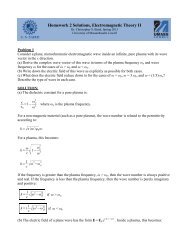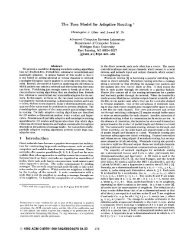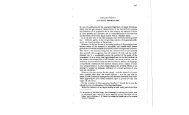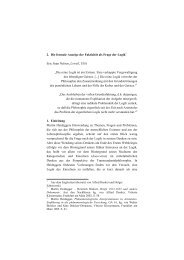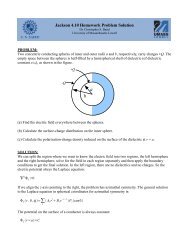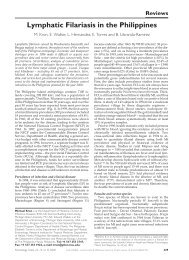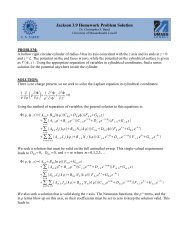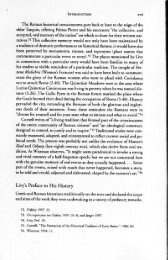CP13.2%20Futrell.%20Seeing%20Red
CP13.2%20Futrell.%20Seeing%20Red
CP13.2%20Futrell.%20Seeing%20Red
You also want an ePaper? Increase the reach of your titles
YUMPU automatically turns print PDFs into web optimized ePapers that Google loves.
110 Alison Futrell<br />
Seeing Red 111<br />
son. The grim resolution of the final scene is only partially offset by the<br />
verbal references to future freedom. It is an uneasy reconciliation, appropriate<br />
perhaps to a film mired in controversy and vicious dispute<br />
throughout its production, a film that went on, nevertheless, to be the<br />
major box office success for 1960.<br />
Figure 3.11 Antoninus and Spartacus as father and son. Speriecus.<br />
establishment of this bond, independent of Rome and based on deeper<br />
truths beyond Roman understanding, constitutes the real victory of the<br />
rebels. Spartacus rejects the death of Antoninus, declaring in a voice<br />
made rough by the intensity of his emotion: "He'll come back. He']]<br />
come back and he']] be millions." The final scene points to this future<br />
freedom as well. Varinia tells a dying Spartacus that his son will know his<br />
dream, will know his father, and thus will know a freedom profoundly<br />
shaped by the experience of the rebel community. Upon this goal, it is<br />
implied, Varinia will focus her entire existence; her love and her life,<br />
which began with Spartacus, will die with Spartacus. The film ends on<br />
an unsettling note.<br />
Projecting Spartacus was a challenge in the highly charged anti-<br />
Communist atmosphere of the 1950s. Spartacus needed to retain an inspirational<br />
quality as a symbol of the eternal human capacity for selfdetermination,<br />
yet it could not blatantly call for the unification of the<br />
~orking class in revolution. By down playing the explicit political rhetorIC<br />
of Spartacus's rebellion, his revolution can be viewed as one that is at<br />
hear~ conservative in its ordering of society into traditional family units.<br />
And indeed, the strong interest in the private side of the public man has<br />
been shared by popular representations of Spartacus since the eighteenth<br />
~entury. 64 Spart4cus is a complex film, however, and the lack of resolution<br />
in the ending distinguishes it from earlier treatments of the story. Destruction<br />
of the family had previously been presented as a reflection or<br />
even as a .c~use of the crushing of the rebels' political dreams. But, in the<br />
film, Vanilla and her SOn Survive, to be escorted to a new home by the<br />
newly p~otective, even fatherly, Batiatus. Spartacus presents an ambiguou~<br />
version of the "age-old fight for freedom," one in which hope and<br />
reSIStance coalesce in the crucifixion of the father and the flight of the<br />
Notes<br />
I. Margulies 196o, frontispiece by Howard Fast quoted here, illustrations by<br />
TomVanSantoOn press books and epic film see Sobchack 199°.24-49.<br />
2. Events of the Sparta can War were recorded by a number of ancient authors,including<br />
Livy Summaries 95-97, Sallust Histories 4.20-41, Florus Abridgement<br />
ofAll the U7arsOver 1200 Years 2.8, Eutropius Digest 6.7, Frontinus Stratagems<br />
2·5·34,Appian Civil U7ars 1.9. I 16-20, Plutarch Crassus 8-1 1, and Diodorus<br />
SiculusLibrary 39.21. The secondary bibliography on this subject is quite large.<br />
Bradley1989 offers an overview; see also Vogt 1974. On Roman slavery see<br />
Bradley1994and Dumont 1987.<br />
3·The two major works on the theme of Spartacus are those of Muller 1905<br />
andMuszkat-Muszkowski1909, with a shorter piece by Olivova 1980.89-99, who<br />
offersinsight into Spartacus's influence on the Czech novel. Wyke 1997b'34-72<br />
alsopresents an intriguing overview of the popular treatment of Spartacus. Extremelyuseful<br />
on the reworking of the theme of classical slave uprisings is Rubinsohn1993;less<br />
so is Stanev 1981.95- 10 1.<br />
4· Diderot and Voltaire are representative of the revised view of Spartacus.<br />
Thearticle on slavery in Diderot's Encyclopedia refers to "natural law," asserting<br />
thatallmen were born free. Diderot goes on to undermine the achievements of<br />
classicalcivilization as a whole because they were all predicated on this ancient<br />
injustice.He draws a connection between the slave wars and Rome's decline,<br />
c~aimingthat Rome's Owninhumanity to slaves would rebound to shake the em-<br />
~lreto its foundations. Spartacus's efforts are thus justified; Diderot characterized<br />
Spartacusas a man of courage and skill, facing adversity without flinching,<br />
w~osearmy was prepared to sacrifice everything for the sake of freedom. See<br />
D1derot1779-82.12.959-67. Voltaire's emphasis on the meaning of history for<br />
allmenat all times laid the groundwork for a new focus on the slave rebellions<br />
ofantiqUity,to which he himself gave legitimacy; he articulated the moral ,:or~<br />
oftheSpartacusuprising in particular, as the most justified, if not the only jusnlied<br />
. hi<br />
.war 111 Istory. See Voltaire 1974.u8'389 (letter # DI5572).<br />
5· By the end of 176o Saurin was invited to become a member of the<br />
AcademieFran~aise, joinin~ the ranks of the philosophe dramaturges. Even so,<br />
~odayhiswork receives little attention. A brief assessment ofSaurin can be found<br />
~~Truchet1974·2.1405-u; see also Stanev 1981.99- 100 , Rubinsohn 1993.3 0 -31,<br />
tV1UsZkat -Mus k ki .<br />
z ows 19°9.19-24, Olivova 1980.9 0 . ..<br />
6. An example of this conflation can be found in Spartacus, II sc. 11, p. 94:



